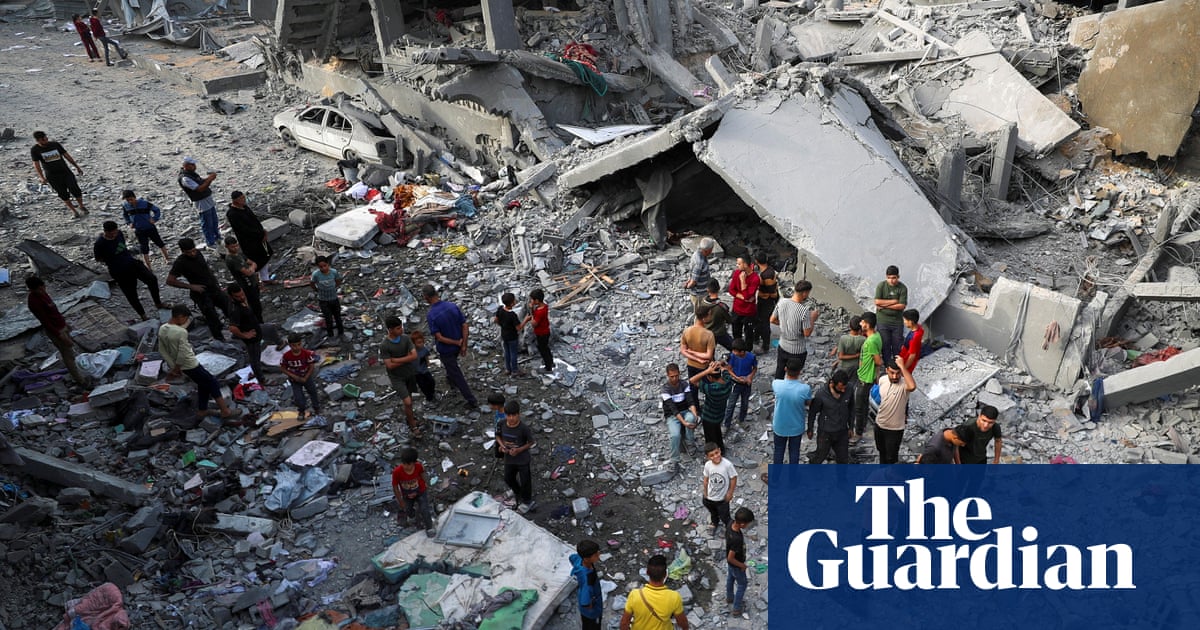The Israeli army has announced the start of a major offensive in Gaza, describing “extensive ground operations” to seize “operational control” of swaths of the devastated Palestinian territory as a second day of indirect ceasefire talks in Qatar ended without any breakthrough.
Israeli military officials said its forces had “eliminated dozens of terrorists, dismantled terrorist infrastructure sites … and [were] currently being deployed in key positions”.
Rescuers and medical sources said as many as 130 people, including many women and children, were killed in a wave of Israeli strikes overnight and through Sunday on neighbourhoods in the north, centre and south of Gaza.
Earlier on Sunday, Benjamin Netanyahu signalled Israel was open to striking a deal with Hamas that involved “ending the fighting”, though the Israeli prime minister laid out conditions that have been repeatedly refused by the militant Islamist organisation.
“Even at this very moment, the negotiation team in Doha is working to exhaust every possibility for a deal … which would include the release of all the hostages, the exile of Hamas terrorists and the disarmament of the Gaza Strip,” his office said in a statement.
A Hamas official told Reuters that Israel’s position remained unchanged. “They want to release the [hostages] without a commitment to end the war,” the official said.
In Gaza, medical officials said they could not cope with the casualties from the most recent strikes.
“Hospitals are overwhelmed with the growing number of casualties, many are children, and … are struggling with shortages of medical supplies,” Khalil al-Deqran, the territory’s health ministry spokesperson, said.
More than 48 people were killed in airstrikes in and around the southern city of Khan Younis, some of which hit houses and tents sheltering displaced people, according to medics at Nasser hospital, which added that more than half of the dead were women and children.
Fatima al-Rahal, 34, who has remained near her ruined home in the northern town of Beit Lahiya described a “nightmare”.
”We can’t sleep at night from the intense fear. The sound of the bombing is terrifying … Our situation is worse than I can describe. It is truly catastrophic. We have nothing left but hope that this war will end as soon as possible,” al Rahal told the Guardian.
Basel al-Barawi, 46, fled Beit Lahiya with his family on Sunday after ten relatives were killed.
“Only a six-year-old girl survived, and she is now in the hospital. We started pulling them from under the rubble – their features were disfigured, their bodies covered in dirt, their clothes torn. Their skin had turned grey from the ash and dust. I felt my heart tearing apart as I carried them,” al-Barawi said.
Israel’s offensive in Gaza has killed more than 53,000 Palestinians, mostly women and children, according to the territory’s health ministry. Israel has accused Hamas of using civilians as human shields – a charge the group denies.
Hamas took about 250 hostages during its October 2023 attack on Israel, which killed about 1,200 people, mostly civilians. Fifty-eight hostages are currently held by Hamas, though a majority of these are thought to be dead.
The indirect talks in Qatar are reportedly focusing on securing a two-month truce, with Hamas freeing about half the 20 or so living hostages it is still holding. In return, Israel would release hundreds of Palestinians from its jails and end the total blockade it has placed on Gaza since early March. The US would offer strong guarantees to ensure talks about a permanent end to the war took place. However, sources on both sides said there had been no progress by late Sunday afternoon.
In March, Israel refused to engage in talks about a second phase of a fragile two-month ceasefire that could potentially have led to an end to the conflict and the release of the remaining hostages. It then cut off all supplies to Gaza and relaunched its air offensive.
Netanyahu has been repeatedly accused of prolonging the war for domestic political reasons – charges he denies – and has frequently promised that Israel will continue to fight until Hamas is “crushed”.
In Israel, Einav Zangauker, the mother of a hostage still held by Hamas, said Netanyahu was refusing to end the war because of his political interests.
“The Israeli government still insists on only partial deals. They are deliberately tormenting us. Bring our children back already! All 58 of them,” Zangauker said in a post on X.
Hamas, which released a US-Israeli hostage last week as a goodwill gesture before Donald Trump travelled to the Middle East for a four-day visit, has always insisted on a deal that definitively ends the war and leads to the withdrawal of Israel’s forces. It has also refused to disarm or to accept the exile of its leaders.
Israel, which claims Hamas systematically loots aid to fund its military and other operations, has put forward a plan to distribute humanitarian assistance from a series of hubs in Gaza run by private contractors and protected by Israeli troops.
The US has backed the plan, which has been described as unworkable, dangerous and potentially unlawful by aid agencies because it could lead to the forced mass transfer of populations.
Food security experts have warned that any delay will cost lives, and that cases of acute malnutrition, particularly among young children, are soaring.
The massive new offensive, the recent strikes and the tight blockade imposed on Gaza in March by Israel have prompted a growing wave of international concern and anger.
The UN human rights chief, Volker Türk, on Friday said the bombing campaign aimed at bringing about a “permanent demographic shift in Gaza” that was in “defiance of international law” and was equivalent to ethnic cleansing.

